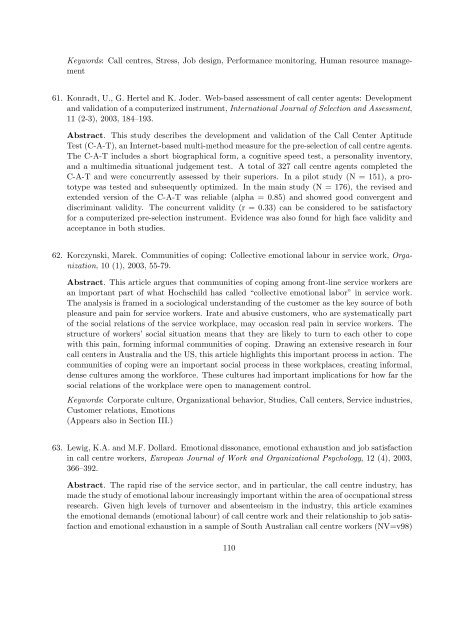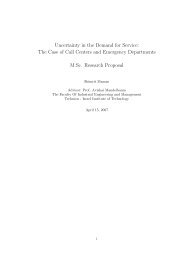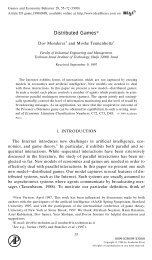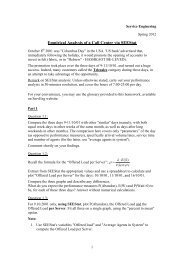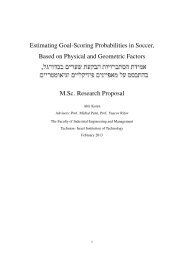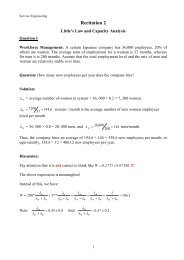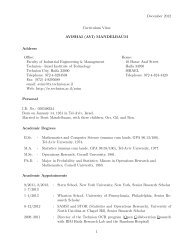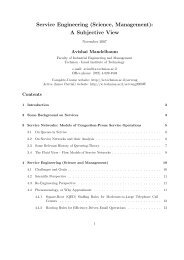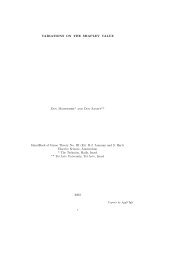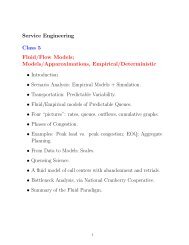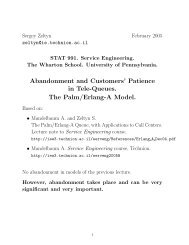CALL CENTERS (CENTRES) - Faculty of Industrial Engineering and ...
CALL CENTERS (CENTRES) - Faculty of Industrial Engineering and ...
CALL CENTERS (CENTRES) - Faculty of Industrial Engineering and ...
You also want an ePaper? Increase the reach of your titles
YUMPU automatically turns print PDFs into web optimized ePapers that Google loves.
Keywords: Call centres, Stress, Job design, Performance monitoring, Human resource management<br />
61. Konradt, U., G. Hertel <strong>and</strong> K. Joder. Web-based assessment <strong>of</strong> call center agents: Development<br />
<strong>and</strong> validation <strong>of</strong> a computerized instrument, International Journal <strong>of</strong> Selection <strong>and</strong> Assessment,<br />
11 (2-3), 2003, 184–193.<br />
Abstract. This study describes the development <strong>and</strong> validation <strong>of</strong> the Call Center Aptitude<br />
Test (C-A-T), an Internet-based multi-method measure for the pre-selection <strong>of</strong> call centre agents.<br />
The C-A-T includes a short biographical form, a cognitive speed test, a personality inventory,<br />
<strong>and</strong> a multimedia situational judgement test. A total <strong>of</strong> 327 call centre agents completed the<br />
C-A-T <strong>and</strong> were concurrently assessed by their superiors. In a pilot study (N = 151), a prototype<br />
was tested <strong>and</strong> subsequently optimized. In the main study (N = 176), the revised <strong>and</strong><br />
extended version <strong>of</strong> the C-A-T was reliable (alpha = 0.85) <strong>and</strong> showed good convergent <strong>and</strong><br />
discriminant validity. The concurrent validity (r = 0.33) can be considered to be satisfactory<br />
for a computerized pre-selection instrument. Evidence was also found for high face validity <strong>and</strong><br />
acceptance in both studies.<br />
62. Korczynski, Marek. Communities <strong>of</strong> coping: Collective emotional labour in service work, Organization,<br />
10 (1), 2003, 55-79.<br />
Abstract. This article argues that communities <strong>of</strong> coping among front-line service workers are<br />
an important part <strong>of</strong> what Hochschild has called “collective emotional labor” in service work.<br />
The analysis is framed in a sociological underst<strong>and</strong>ing <strong>of</strong> the customer as the key source <strong>of</strong> both<br />
pleasure <strong>and</strong> pain for service workers. Irate <strong>and</strong> abusive customers, who are systematically part<br />
<strong>of</strong> the social relations <strong>of</strong> the service workplace, may occasion real pain in service workers. The<br />
structure <strong>of</strong> workers’ social situation means that they are likely to turn to each other to cope<br />
with this pain, forming informal communities <strong>of</strong> coping. Drawing an extensive research in four<br />
call centers in Australia <strong>and</strong> the US, this article highlights this important process in action. The<br />
communities <strong>of</strong> coping were an important social process in these workplaces, creating informal,<br />
dense cultures among the workforce. These cultures had important implications for how far the<br />
social relations <strong>of</strong> the workplace were open to management control.<br />
Keywords: Corporate culture, Organizational behavior, Studies, Call centers, Service industries,<br />
Customer relations, Emotions<br />
(Appears also in Section III.)<br />
63. Lewig, K.A. <strong>and</strong> M.F. Dollard. Emotional dissonance, emotional exhaustion <strong>and</strong> job satisfaction<br />
in call centre workers, European Journal <strong>of</strong> Work <strong>and</strong> Organizational Psychology, 12 (4), 2003,<br />
366–392.<br />
Abstract. The rapid rise <strong>of</strong> the service sector, <strong>and</strong> in particular, the call centre industry, has<br />
made the study <strong>of</strong> emotional labour increasingly important within the area <strong>of</strong> occupational stress<br />
research. Given high levels <strong>of</strong> turnover <strong>and</strong> absenteeism in the industry, this article examines<br />
the emotional dem<strong>and</strong>s (emotional labour) <strong>of</strong> call centre work <strong>and</strong> their relationship to job satisfaction<br />
<strong>and</strong> emotional exhaustion in a sample <strong>of</strong> South Australian call centre workers (NV=v98)<br />
110


